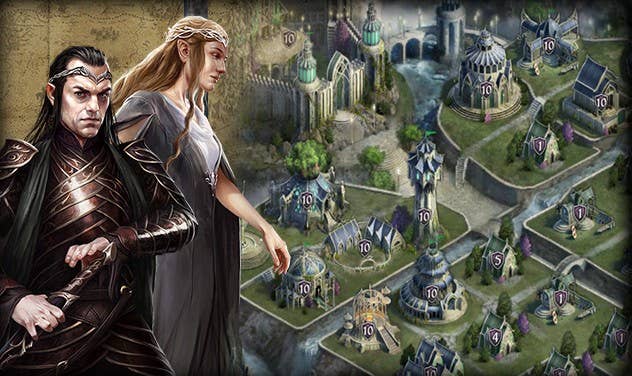Kabam: Licensing to thrill
"I think that licensors are much more ready, willing and able to be creative in their business dealings with developers"
Mad Max, The Hunger Games, Fast & Furious 6, Marvel, The Godfather, The Hobbit... even if you're not a habitual free-to-play gamer you're probably aware of Kabam's impressive stable of licensed titles. Heck, your mother has probably seen that TV commercial where the elf and the dwarf have a tiff on a park bench.
We spoke to the man responsible for overseeing these existing licenses and securing new ones for the future, Chris Petrovic, the head of corporate development and licensing at Kabam. He explained why the time has come to forget the awful spin-offs of the past (I'm looking at you, X-Men Origins: Wolverine) and to reconsider what a licensed game can be.
Finding brands that have a resonance with the consumers and a pretty varied audience around the world is important to us.
"We work hand in hand with the creators in many cases of these IP"
We also like to look at opportunities that have something that's happening in markets today. Ideally, major motion picture releases because number one, it's reaching a global audience and number two, there's a tremendous amount of support in consumer outreach that we get from our partners. Number three, there's a presumed install base around the world that are fans of that IP in that movie that we could tap into.
One of the other things that we look at are licenses that are conducive to long term narrative and storytelling gaming experiences that we can tap into fully. Obviously, The Hobbit, Lord of the Rings, Hunger Games, Mad Max. These are all examples of licenses and associated movies that have deep character sets, deep environments and in some cases deep lore around the story.
For us, being brand stewards is an opportunity for us to take that moment in time that the movie represents and be that connective tissue for the consumers while they wait for the next installment. We work hand in hand with the creators or the distributors of these IP who allow us the opportunity to collaborate with them and their creative folks to expand on what they've already created.
That connective tissue is really important because it allows us to put games in market that stand the test of time. Games that are out there for a number of years and generating a tremendous amount of gameplay - and obviously generating a material amount of revenue for both us and our partners - all of which are important considerations.
"We've established ourselves as a really good brand steward within the mobile gaming ecosystem"
For those of us who have been in the industry for a long time, we've seen the ebb and flow of how licenses get to market. Everything from back in days of mobile 1.0, before smartphones. I was a part of a company that represented a portfolio of brands and we had to aggressively go out after them to try and secure those rights for the distribution to the carriers around the world.
There are studios who have varying degrees of internal resources that are dedicated toward making games off of the studio's IP, but also a lot of these studios have multi-faceted strategies where they have a combination of internal resources, but then they also have a licenses group to generate revenue off of their licenses.

We've established ourselves as a really good brand steward within the mobile gaming ecosystem and so we've had the good fortune of having quite a few of those folks in Hollywood recognize that and reach out to us to engage about how we can work together - "Hey, you did it here with Hobbit. You did it here with Fast & Furious. You did it with Godfather. How can we work together to make it a success here on this piece of IP?"
There are fewer and fewer companies of our scale that do it really well, and obviously when you're dealing with organizations that are in a revenue generation mode, they want to make sure that they're partnering with somebody that can deliver the maximum return on investment. Given our global reach, given our historic success, given our expertise and free-to-play and marrying gaming and entertainment, it leads to a lot of great doors opening and a lot of great discussions around licenses opportunities.
Our best practices are consistent across all of our games. I think where we see the biggest benefit relative to non-licensed games is in the acquisition. In terms of installs and customers first coming into the games, we see a tremendous amount of activity there relative to other companies in the space or even non-licensed games.
From there on in it's our same best practices in terms of retention or monopolization that you would see throughout all of our games. I just think that there's that little added bit of secret sauce that goes along with a consumer having such a strong affinity for the brand, but they're willing to spend that much more time engaging with it. We strive for top level metrics of success across all of our games regardless of whether or not there's licensed IP or not.
[With Fast & Furious 6] I think it was like 40 million installs within a four to six week period of launch, which is a tremendous testament to the brand, to the consumer base and obviously to the fact that people knew about the game, they got into it, and then they kept playing it. From there it's something that's really unique to having these iconic licenses attach to a game that you're bringing in the market.
We see activity from them across a period of our games within our portfolio. Obviously, not necessarily equally weighted all across the board because they have their preferences, but I think our customers specially the most loyal ones come to expect a certain quality and style of gameplay from us whether it's traditionally been in the strategy or RPG genre.
We've done very well in those genres and now you're seeing us, what we did in Fast and Furious, in racing. What we announced with Marvel at Comicon with fighting. We're getting into these other genres and the hope is that those customers that have known us for these other genres will now follow us into these newer ones. We think that having that licensed IP is a key part of that retention if you will across our portfolio.
It depends on what your data points are for analyzing the customer base, there's obviously so many touch points that the Hunger Games license has across the world with customers. The theatrical is just one data point. We rely quite heavily on an internal group that we have here at Kabam called, "Consumer Insights," which is very unique within the mobile games industry.
They identify for us consumer likes and dislikes around genres of gameplay, married up to certain piece of IP. It informs a lot of our decision making around how we develop both our own games as well as which licenses we pursue. We saw a tremendous amount of interest across the board, both equally male and female, for the Hunger Games IP married to a certain kind of game genre in particular. Which is what you'll see later this year when it comes out.

We also definitely don't ignore the fact that the female gameplaying audience is a tremendously important one. Both from the perspective of what percentage of total gamers are female and then what percentage of gamers that are female actually play for a long period of time, and those stats are ... I don't them to hand, but you know better than I do, they're very compelling.
Again, as we grow in scale, our obligation is to deliver games that are more and more appealing to the mass audience, so that we can bring in players from both sides of the fence so they can experience this together.
The one thing I will say about our constituents here in the game developer community; there hasn't been a better time to engage with licensors. Because again games continues to play such a big part of the consumer mind share as it relates to interactive entertainment. I think that licenscors across the board are much more ready, willing and able to be creative in their business dealings with developers of any size - not just limited to companies like ourselves.
There are quite a few games that are out in market today and had been out that were launches by small developers and publishers that have done extremely well. That's because the licensors - again, like I mentioned being a lot more flexible - because they just want to see their IP handled in the best way possible for the kinds of gameplays that they envisioned could be conducive.
"It's about looking at the IP opportunity against game genre competencies that we have internally today"
Now, certain license holders like to work with just one partner per movie cycle and others that have kind of more evergreen catalog of characters or IP enjoy working with multiple partners because they feel like they can attract a multitude of audiences across multiple genres.
Even for a company as big as Kabam, we're not well suited to develop games across all genres. For example, if somebody wanted to do a casino game, or a city building game, or something more casual or match three, there are companies and developers out there that have done that very well. For us, it's about looking at the IP opportunity against game genre competencies that we have internally today.
Whether that's off of an offshoot of an internally developed game that we've done on our own IP, or it's a genre that we have on our roadmap to get into anyway and we feel like putting a license on top of that will allow us to really kind of get great trajectory on it. A number of different factors come into play, but again if it's an opportunity that doesn't fit within what we can deliver to consumers or don't have a history in delivering to consumers we're not necessarily going to go after it just for the sake of getting a license if we don't feel like we can do a good job.
My hope is there's a licensing businesses is robust enough to keep me more than busy just on that side alone. We're also practical in understanding that in order to have success and longevity, that you have to maintain balance. For us, balance means a combination of our original IP, of which there is a tremendous amount out there and a tremendous about coming to market, along with licensed IP as well.
"There are benefits, practical and strategic benefits to having a balanced portfolio"
For us, we don't want to put all of our eggs in one basket or the other, a balanced portfolio approaches best. Now, whether that's 50-50 or 60-40, it kind of varies at any point in time, but the pendulum is not going to swing too far one way or the other. Because there are benefits, practical and strategic benefits, to having a balanced portfolio.
We have wonderful, creative folks here in our studio through out the world that love to create IP, and so we like to give them that opportunity whenever possible.

